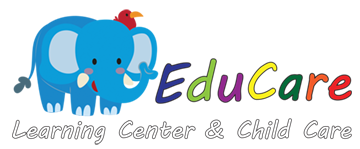Our Philosophy:
At EduCare, we believe that young children learn best through play-based exploration at their own individual pace. As a community of early childhood educators, we feel that our role is to provide a variety of opportunities for your child to play and learn through positive interactions, unique materials, and engaging activities that support child development in all areas.
Our Curriculum:
Our trained and experienced teachers design a unique curriculum that is responsive to the needs and interests of the young child and aligns to the Illinois Early Learning Standards. Teachers continuously plan lessons and activities that are of interest, relevance and above all else, are developmentally appropriate for the overall development of the child.
Our curriculum is comprised of integrated thematic units that encourage children to explore concepts across the different content areas including literacy, language, math, science, social studies, the arts, physical development/health, and social/emotional learning.
Rather than choose a “ Store-Bought”, “ One-Size-Fits-All” approach to curriculum, we allow our staff to continuously craft and adapt their curriculum as a team of educators.
STEAM EVERYDAY!
At EduCare, our daily activities in all the classrooms are based on STEAM.
STEAM is an educational approach to learning that uses Science, Technology, Engineering, the Arts and Mathematics as access points for guiding student inquiry, dialogue, and critical thinking. The end results are students who take thoughtful risks, engage in experiential learning, persist in problem-solving, embrace collaboration, and work through the creative process. These are the innovators, educators, leaders, and learners of the 21st century!
At EduCare, we know that there is a great diversity in children, when it comes to their cognitive development.
We believe that children can perform more challenging tasks when assisted by advanced helpers. These tasks help promote their maximum cognitive growth.
Our teachers are trained to scaffold children to help them perform tasks in their Zone of Proximal Development (ZPD).
This is done in a variety of ways:
- By demonstrating the proper performance of the task in a way that children can easily imitate.
- By dividing a complex task into several smaller, simpler tasks.
- By providing a structure or set of guidelines for how the task should be accomplished.
- By asking questions that get children thinking in appropriate ways about the task.
- By keeping children’s attention focused on relevant dimensions.
- By giving frequent feedback about how children are progressing.
As children become more adept at performing an activity, assistance is gradually phased out so that they eventually accomplish it on their own.
ASSESSMENTS:
Assessment refers to the wide variety of methods or tools that educators use to evaluate, measure, and document the academic readiness, learning progress, skill acquisition, or educational needs of students.
Our infants and toddler teachers and care providers are always monitoring the cognitive development of infants and young children to identify significant development delays that require intervention or perhaps to determine readiness for various kinds of educational experiences.
Twice a year, our preschoolers are formally assessed by our trained staff. These assessments are conducted throughout the months of October and again in May. Each assessment is aligned to your child’s age. Teachers use assessment as a tool to ensure that children are receiving the services they need and to plan and adapt their curriculum.
Informal, on-going assessments are also conducted on a regular basis to monitor your child’s progress.
